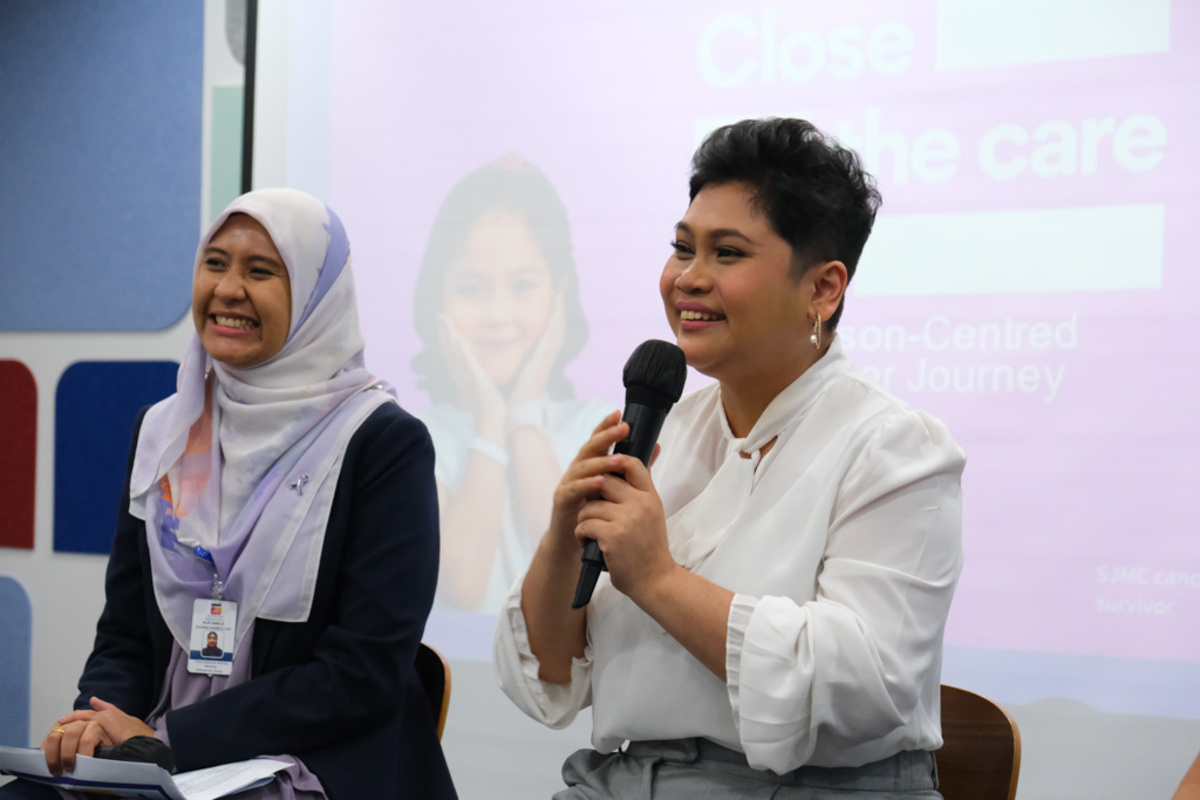SUBANG JAYA, April 2 — It was two days before Hari Raya Aidilfitri when Noor Shareena Aleeya was diagnosed with Stage One breast cancer in April last year.
She had clothes all packed in a bag, ready to make the trip back to her husband’s hometown when she learned she needed a mastectomy – a surgical procedure to remove all or some of the breast tissue.
“I called my husband, and I said, ‘I have breast cancer,’ and he said, ‘Haha,’ because I joke a lot. He said, ‘Don’t lie,’ and I said, ‘No, I have breast cancer,’ and he was like, ‘Oh my God.’
“He picked me up from SJMC and I think that was the first time I saw him cry so hard,” Shareena said during a panel sharing session held in conjunction with World Cancer Day at Subang Jaya Medical Centre (SJMC) last February 27.
Shareena initially noticed pus coming from her nipple, and assumed it was a breastfeeding issue. However, when the pain became unbearable at work, she sought medical help.
Despite initial X-ray results finding nothing, her doctor prescribed antibiotics for a suspected milk duct problem. When antibiotics failed to help, Shareena underwent surgery to remove the affected milk duct. It was during this surgery that the cancer was discovered.
“We did the surgery, and it turns out, the cancer cell was so tiny and underneath the affected milk duct, which is why we couldn’t detect it,” she said.
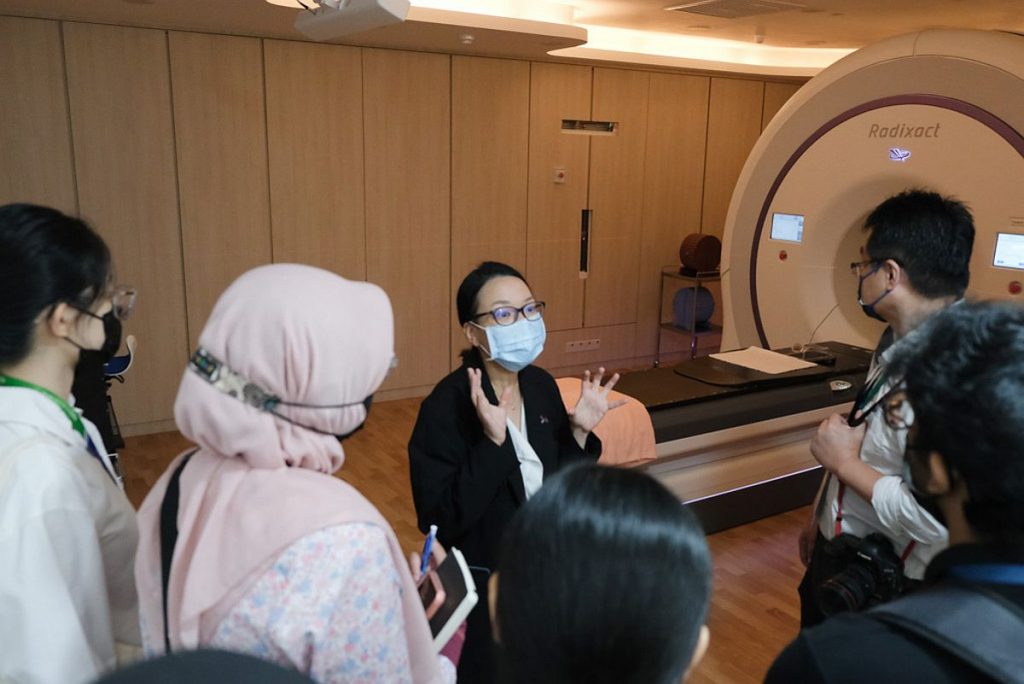
A cancer diagnosis can be life-changing for both the patient and caregiver. Upon diagnosis, people with cancer and their families often have to make prompt decisions about medical treatment that can be complicated by anxiety, unfamiliar terms, and a sense of urgency.
For Shareena, opting for a mastectomy to fully remove her breast tissue involved decisions about choosing an implant and determining the type of cancer treatment she would pursue post-surgery.
“The doctor asked if I wanted to take menopause pills or do chemotherapy, since I’m still young, to eliminate any reason for a relapse.” Shareena opted for chemotherapy.
“I spoke to my doctor and did my own research. I was working at the time and I had a baby. I was worried that with the menopause pills, my body would heat up and I wouldn’t know how I would feel.
“The chemotherapy is hard too but it’s only for a week. The menopause pills, I would have to take them continuously for three years before the period stops,” Shareena explained.
Most Breast Cancers Are Curable
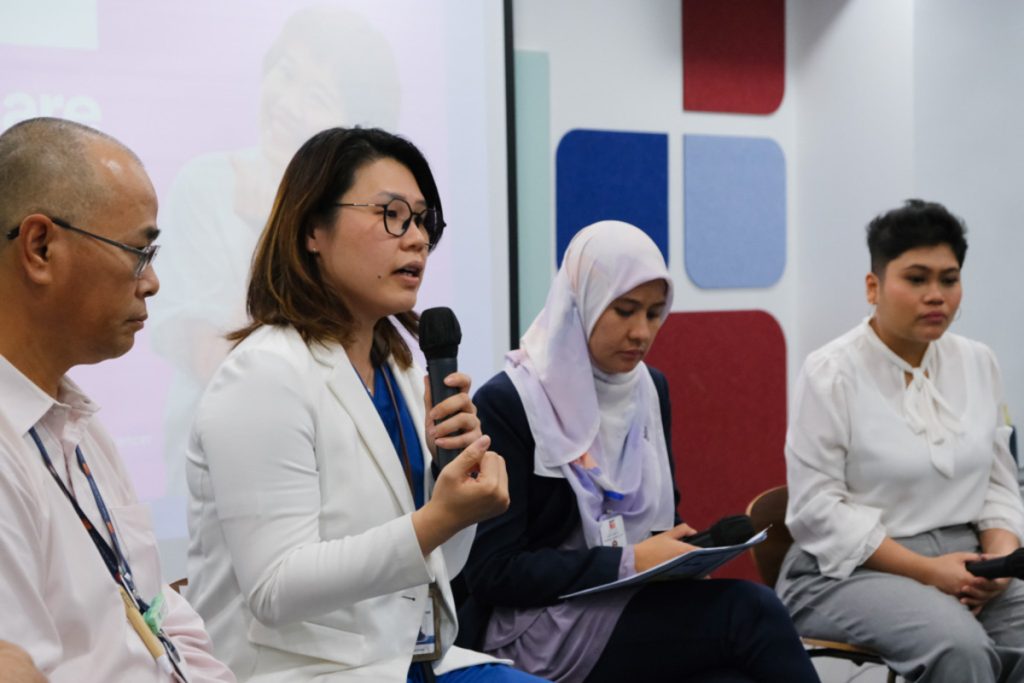
SJMC boasts a 100 per cent five-year relative survival rate of women with stage one breast cancer treated in its hospital. According to a study published in the Asian Pacific Journal of Cancer Prevention in 2015, the relative survival rates at SJMC were as follows: stage one, 100 per cent; stage two, 95 per cent; stage three, 69 per cent; and stage four, 36 per cent.
The analysis, covering 675 patients treated between 2008 and 2012, included 65 per cent with early breast cancer, 20 per cent with locally advanced breast cancer, and four per cent with metastatic breast cancer.
Dr Teh Mei Sze, a consultant breast surgeon (oncoplastic) at SJMC, explained that most breast cancers are curable.
“For breast cancer, the good news is that it is mostly curable as long as it’s not stage four. Stage four doesn’t mean there is no hope. It is treatable but not curable, just controllable, and the aim for stage four would be to maintain the best quality of life.
“For anything below stage four – stage zero, one, two, and three – it is curable, so the aim is to remove (the cancer) for the best oncological and survival outcomes. Then there is the cosmetic outcome because that also affects the quality of life for the patient.
“In terms of types of treatment, whether the patient needs to go for chemotherapy, radiotherapy, or surgery, it is determined by the extent of the disease, the stage of the disease, and what the patients want.
“Another thing about breast cancer is, apart from stages, there are many types. There are types that are more aggressive and less aggressive. When the disease is more aggressive, like HER2 positive or triple negative, it is easier to spread and the relapse rate is higher.
“These are the diseases where we would recommend chemotherapy because chemotherapy is a drug that goes into the bloodstream so it treats the entire body.
“That is how we determine a patient’s treatment plan. It’s not about picking one. Sometimes you may require all three, sometimes just surgery, sometimes chemotherapy and surgery so it depends on a lot of factors,” Dr Teh said.
‘No One Can Be Prepared For Cancer, Especially When It Happens To Your Own Child’
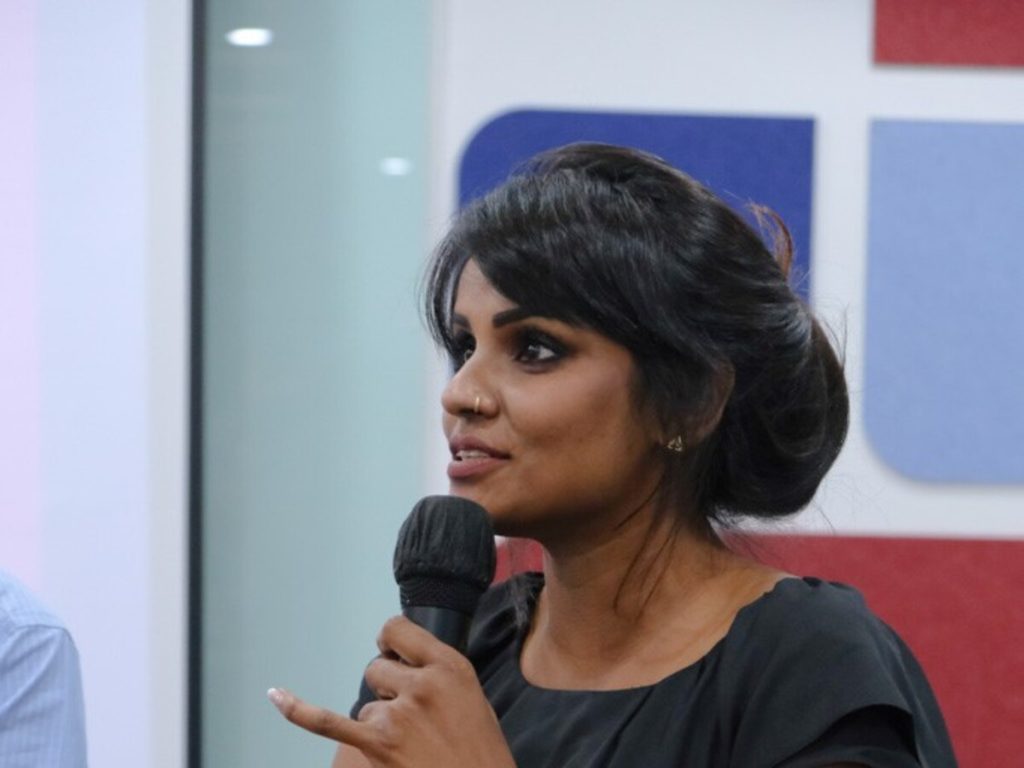
Lavaniyah Ganapathy, a mother of a child with leukaemia, never considered that children could have cancer until her daughter’s diagnosis. “The first child I knew of with cancer was my own,” she told the sharing session at SJMC’s World Cancer Day event.
Lavaniyah’s daughter, who was six at the time, complained of eye pain, which Lavaniyah thought was due to long online classes during Covid lockdowns. A couple of days later, her daughter appeared ill and pale, even requesting to sleep during an online class.
“At first, I thought she was just tired,” Lavaniyah recalled. The following day, her daughter developed a fever. “I couldn’t understand why she suddenly had a fever since we were all staying home,” Lavaniyah explained. Initially, they treated it with paracetamol.
“But after four hours, the fever returned, and we suspected something more serious, maybe an infection, or even Covid,” Lavaniyah said. They then decided to take her to the hospital.
“Her white blood cell count was more than a million,” Lavaniyah said. Her daughter’s test results were taken to the haematology and oncology department for further review. “Some of my friends, who are doctors, told me there was something wrong with her blood. They told me to be prepared for everything.”
The next day, Lavaniyah found out that her daughter had Philadelphia chromosome-positive
acute lymphoblastic leukaemia – a rare subtype of the most common childhood cancer. “It was a dark day,” Lavaniyah said.
“I believe no one can be prepared for cancer, especially when it happens to your own child.”
SJMC Accredited As Centre Of Excellence For Oncology Services By Australia’s ACHSI
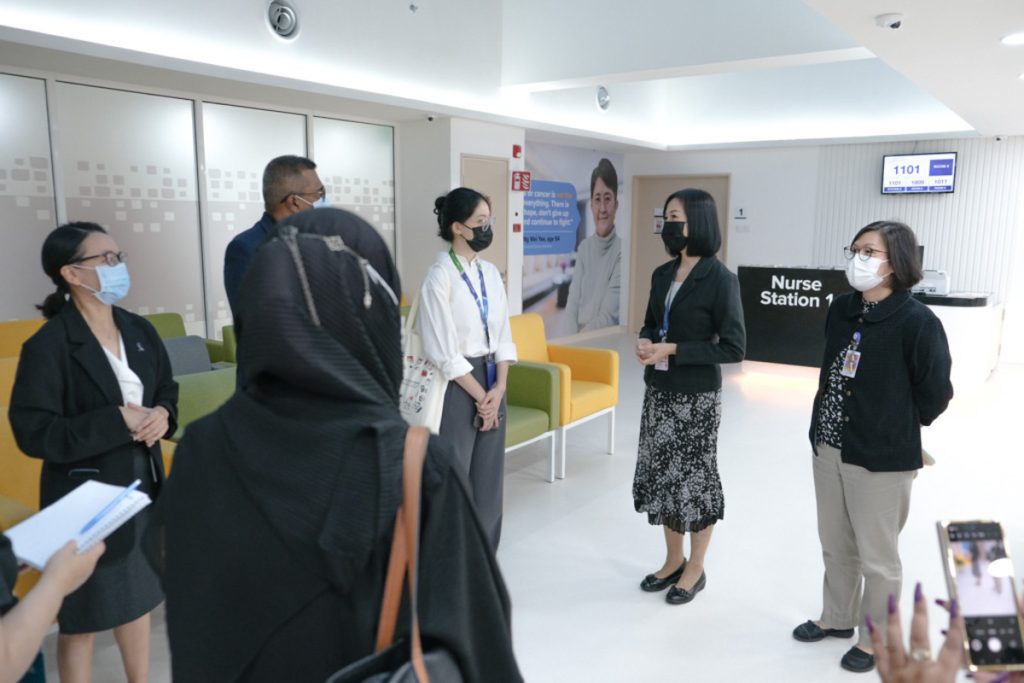
Cancer care and support go beyond just treatment. There is also a need for counselling, nutrition, pharmacy, patient and family support, information, and public education.
Patients at SJMC are cared for by a multidisciplinary and experienced team of medical specialists, oncology nurses, nurse educators or counsellors, radiation therapists, medical physicists, liaison officers, cancer care coordinators and other dedicated staff.
This person-centred care approach where the patient is at the heart of care led to SJMC’s accreditation as a Centre of Excellence for Oncology Services by the Australian Council on Healthcare Standards International (ACHSI) last year, the first in Asia Pacific.
During the Covid lockdowns, Lavaniyah found support within the hospital itself after her daughter was diagnosed.
“With the movement control order in place, the nurses, counsellors, and other caregivers became my support network. They are my family,” Lavaniyah explained. “Speaking to those who have gone through a similar journey makes me feel more positive and courageous.”
“I would always refer to the counsellor, the nutritionist on how to care for a cancer patient. Nutrition, especially, is very important for people who are immunosuppressed as infections are more prone so we have to manage them.
“The initial part of the cancer diagnosis was traumatic. But as I progress through the journey, I feel more confident,” Lavaniyah said.
Oncology Educators ‘Make Me Feel So Safe’ During Chemo
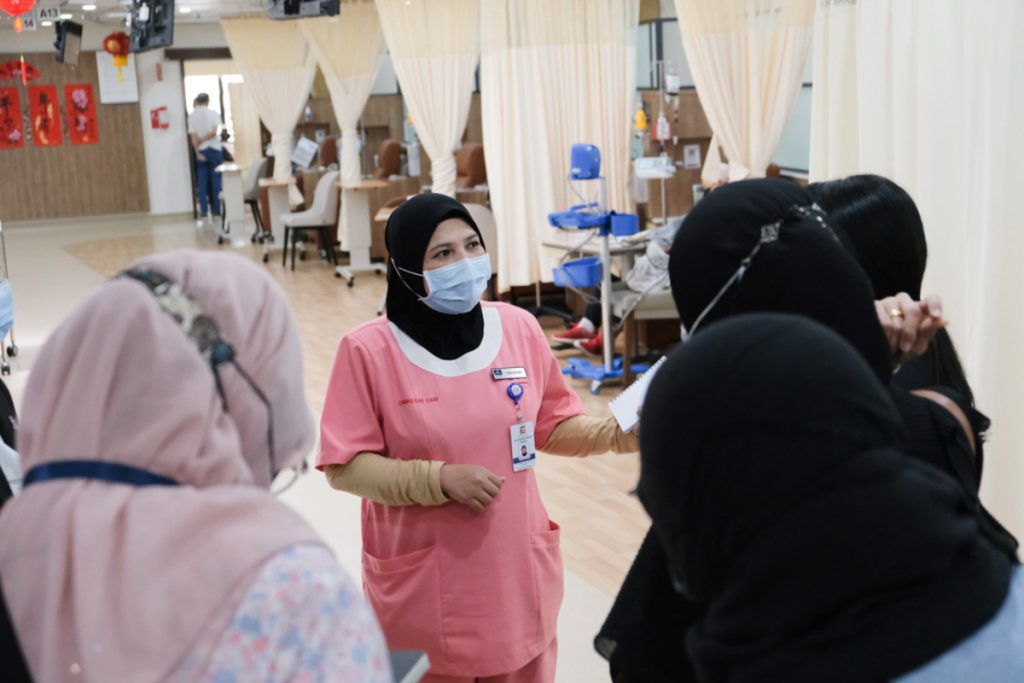
SJMC’s haematology and oncology daycare facility delivers top-tier treatment and cancer care through a personalised, patient-centred approach. Staffed by a multidisciplinary team including oncologists, haematologists, oncology nurses, pharmacists, and counsellors, the facility offers separate units for adult and paediatric patients.
The paediatric unit manages children with cancer as young as three months old.
Noor Haniza Mohd Rashid, an adult oncology educator at SJMC’s haematology and oncology daycare facility, dedicates approximately an hour per patient to communicate with both patients and caregivers.
“When patients come in for chemotherapy, I provide detailed explanations about their treatment, potential side effects, expected outcomes, and how to manage themselves at home,” Noor Haniza explained. “I also offer basic nutrition guidance and emotional support. For more in-depth concerns, I refer them to our dietitian or counsellor.”
“Patients will also receive a diary to track their medication, where they can note details like medication given, side effects, and management. I also provide specific contact numbers for any assistance needed, and provide advice according to individual needs,” she added.
“I think my role is very important. I will communicate with the doctors, the patients, and the caregivers. I will sit down with them until they understand what treatment they are getting, what they are receiving in their bodies. Usually one hour, sometimes about 45 minutes, for every chemotherapy session that they attend,” Noor Haniza said.
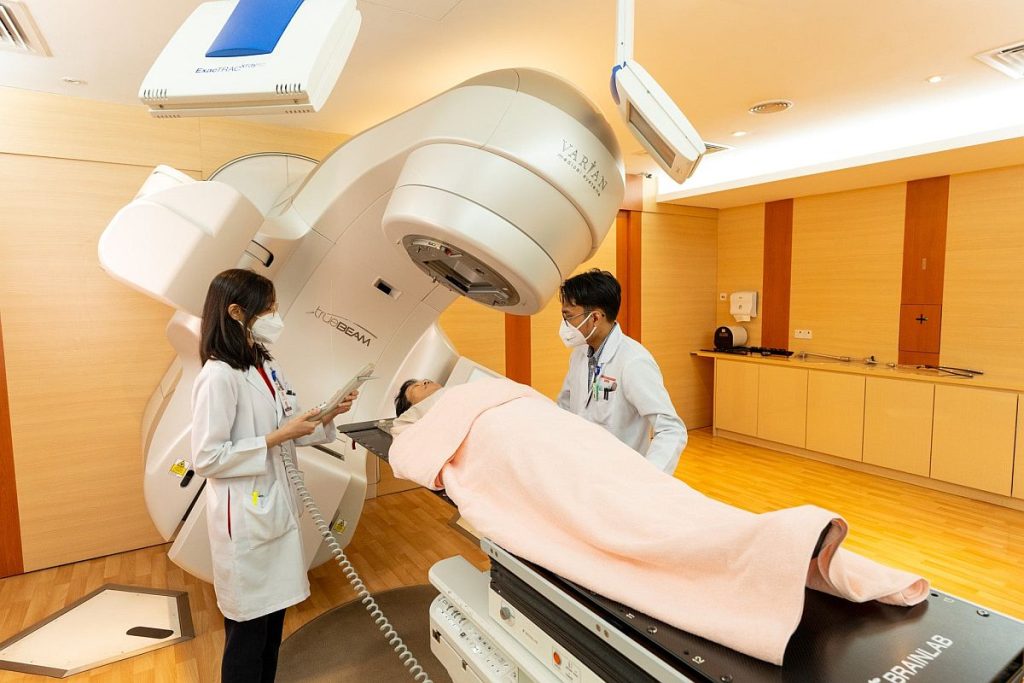
Patients undergoing chemotherapy typically spend four to five hours at the daycare facility, although some may require six to eight hours. Those requiring extended stays overnight are admitted to the ward.
The daycare facility is staffed by four oncology educators, each specialising in adult, paediatric, breast, and haematology care.
“They actually do a very good job,” Shareena said. “When I’m at home, they would call me to ask if I’m okay and if I’m eating well. I went to the emergency department a lot because I had allergic reactions, and the staff there were very empathetic.
“Everytime I go for chemotherapy, they will check me thoroughly to make sure I’m okay. They made me feel so safe. My husband is there for every chemotherapy session except for one because he had to work. But everyone has been very friendly. It has been a really good experience so far.”
As for Lavaniyah, she is convinced that her daughter is in good hands at SJMC. “I know she is in good hands. As a mother, that gives me relief and that is the best part.”



